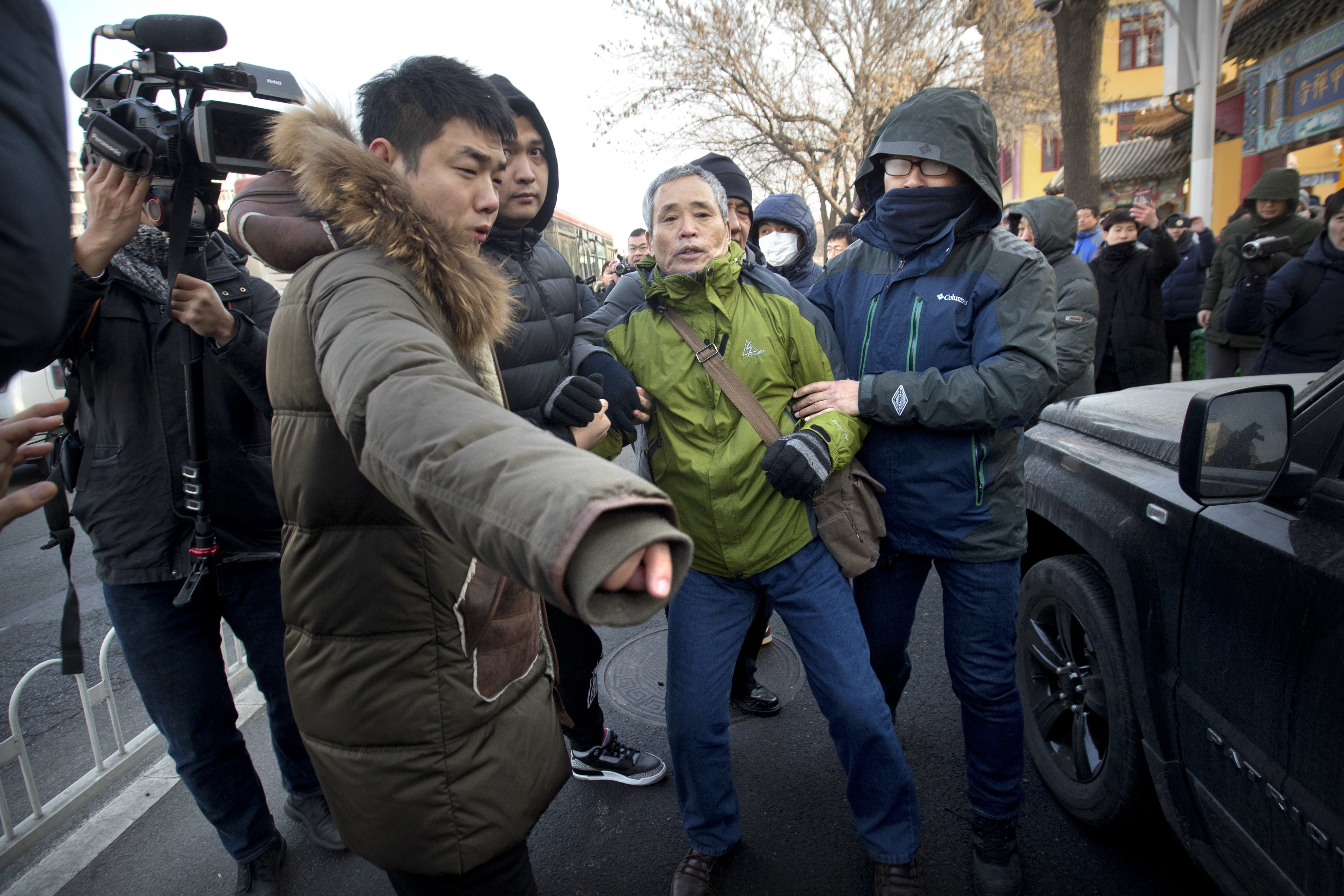
Prominent Chinese rights lawyer tried in closed proceedings
TIANJIN, China (AP) — The trial of a prominent human rights lawyer began in northern China on Wednesday with about two dozen plainclothes officers stationed outside a courthouse and at least one supporter taken away by police.
Reporters, foreign diplomats and supporters were prevented from approaching the municipal court in Tianjin city where lawyer Wang Quanzhang was being tried. Wang’s wife, Li Wenzu, was kept from attending the proceedings by security agents who had blocked the exit of her apartment complex since Tuesday.
Li told The Associated Press by phone Wednesday that Liu Weiguo, Wang’s government-appointed lawyer, confirmed the trial had started. But he did not tell her whether it was now over or whether a verdict had been reached.
The court said in a statement on its website that it “lawfully decided not to make public” the trial hearings because the case involved state secrets. A decision will be announced at a future date, the court said.
Wang is among more than 200 lawyers and legal activists who were detained in a sweeping 2015 crackdown. A member of the Fengrui law firm, among the most recognized in the field broadly known in China as “rights defending,” he was charged with subversion of state power in 2016. He has been held without access to his lawyers or family for more than three years.
Fengrui has pursued numerous sensitive cases and represented outspoken critics of the ruling Communist Party. Wang represented members of the Falun Gong meditation sect that the government has relentlessly suppressed since banning it as an “evil cult” in 1999. Group leaders have been sentenced to lengthy prison terms and ordinary followers locked up as alleged threats.
Legal advocacy had flourished in the decades following China’s opening up, as lawyers defended the disenfranchised and contributed to a nascent civil society. Wang himself worked on several land rights cases on behalf of poor villagers.
While these lawyers frequently faced intimidation and harassment from the authorities, the roundup in 2015 marked a severe turning point — it made clear that human rights lawyers would come to face the kinds of charges previously reserved for those they defended. The coordinated sweep left lawyers detained, disbarred, under house arrest or facing vague charges. It’s known as the “709 crackdown” for the date, July 9, on which the majority of them were taken.
Most of the lawyers have since been released, though they can no longer practice. Wang is believed to be one of the last to be tried.
Li has campaigned tirelessly for her husband’s release. Earlier this month, she and other wives of detained lawyers shaved their heads in an act of protest. In Chinese, the words for “hair” and “law” are near-homophones — “We can be hairless, but you can’t be lawless,” they chanted.
She was given only two days’ notice that the trial was to take place. The trials of Chinese human rights figures are often scheduled during the Christmas period, when many Western diplomats and journalists are away on holiday.
On Tuesday, five cars were stationed outside Li’s home, she said, and a state security officer urged her not to travel to Tianjin. On Wednesday, they cordoned off her apartment unit with police tape.
Li and Wang Qiaoling, the wife of another rights lawyer who was detained, said in a statement that a state security officer offered early Wednesday to drive them to Tianjin, but he said that the trial proceedings were not public and that they would not be allowed to attend.
Li and Wang wrote that they declined the officer’s offer and tried to leave Li’s apartment complex, only to find that all six gates out of the complex had police parked outside.
Diplomats from the U.S., Swiss, U.K. and German embassies were outside the Tianjin courthouse. They said they had requested access to attend the trial but were denied.
A man shouted his support for Wang Quanzhang before he was shoved into a car by plainclothes officers.
“A frail scholar and you all torment him like this,” Yang Chunlin yelled, referring to Wang. “Wang Quanzhang is the greatest person in China.”
“I demand political reform, I demand civil rights, I demand elections within the party, respect for human rights,” Yang said before he was taken away.
___
Wang reported from Beijing.
The Western Journal has not reviewed this Associated Press story prior to publication. Therefore, it may contain editorial bias or may in some other way not meet our normal editorial standards. It is provided to our readers as a service from The Western Journal.
Truth and Accuracy
We are committed to truth and accuracy in all of our journalism. Read our editorial standards.
Advertise with The Western Journal and reach millions of highly engaged readers, while supporting our work. Advertise Today.












